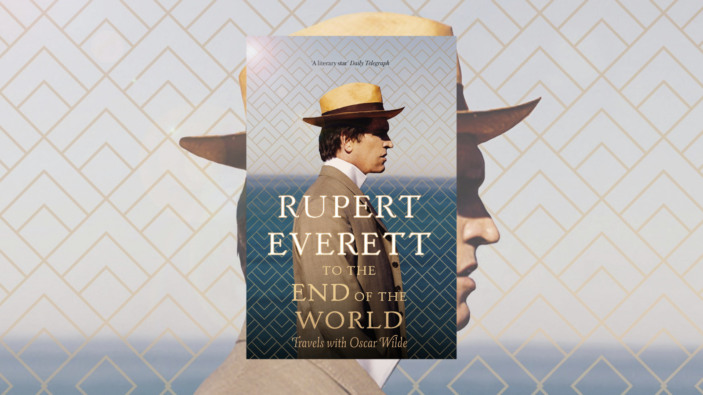
To the End of the World: Travels with Oscar Wilde is the latest memoir from actor, author, and now director Rupert Everett. In the book Everett, recounts the story of how he set out to make the film of Oscar Wilde’s last days, 2018’s The Happy Prince. The book, then, is part memoir, part travelogue, and part film diary.
The Happy Prince’s journey to screen was not an easy one. For context, To The End of the World clocks in at around 340 pages. Filming doesn’t begin until the two hundred page mark and the book’s third act. And, even then, it’s not documented in substantial or minute detail. So any film students may not learn a huge amount about the technicalities of filmmaking. The lessons it imparts, are instead, ones of determination and perhaps artistic stubbornness. As, Everett remarks early in the book, the film might’ve been made much earlier had he not been so adamant to be its star.
The chronology of To The End of the World is not exacting or firm. The almost picaresque nature of the book, with its ever moving central protagonist, allows for narrative diversions. Certain locations, or certain encounters trigger connections to moments or people from Everett’s past. Sometimes there’s an Oscar Wilde connection, sometimes not. The most profound and affecting of these stories don’t come from celebrity encounters. Rather they’re populated by Everett’s friends and relatives, who certainly in the case of Aunt Peta, and Lychee, are often larger than life and evocatively captured by Everett’s prose.
As someone not overly familiar with Everett and his body of work, beyond a few notables, I found To the End of the World to be a surprisingly enjoyable read. Everett makes for a charming narrator; quick witted, and able to capture a scene wonderfully in prose. There’s a section early in the book, a description of a long since closed Cosmo Restaurant, and Everett’s prose is so evocative, that it really brings that scene to life. There are many other moments like this in the book too; they’re maybe not integral to the larger narrative, but they’re all the more memorable for their skill and delivery.
To The End of the World is also unflinchingly honest, or at least that’s how it appears. Everett is not shy about voicing his opinion or his observations. Whilst friends and colleagues find themselves scrutinised in print, no-one bares the brunt of Everett’s unflinching “honesty” quite as much as himself. He describes his career, for example, as being in the “where are they now” category. He also often plays up the decline of his career for dramatic effect. Everett clearly lays out the fleeting nature of fame, and does his best to dispel a lot of the romanticism that surrounds filmmaking in this book. And yet, Everett’s disarming and charming writing style, makes even the most disastrous days seem enjoyable.
I will say, do not read To The End of the World and expect to be overwhelmed with Oscar Wilde trivia. Nor with anything resembling a literary critique of his work really. Nor frankly, do you really need to know a great deal about Wilde to enjoy this book. Certainly, he gets referenced often; much of the book follows Everett’s journey to making a movie of his life after all, often at times retracing elements of his exiled life. But, for me, the spectre of Wilde was often a fleeting visitor. One perhaps best viewed as a prism through which Everett could explore his own apparent fall from grace.
To The End of the World is an enjoyable glimpse into the fleeting nature of fame and filmmaking. Everett’s journey to get his passion project to screen may have been arduous. But, its rendering here in print is nothing of the sort. Full of charm To The End of the World is thought-provoking, funny, often poignant and has me queuing up The Happy Prince on Netflix.
![]()
![]()
![]()
![]()
![]()
FOUR STARS (OUT OF FIVE)
Rupert Everett’s To The End of the World: Travels with Oscar Wilde is out now, published by Little Brown.
Grab your copy from Booktopia HERE.
